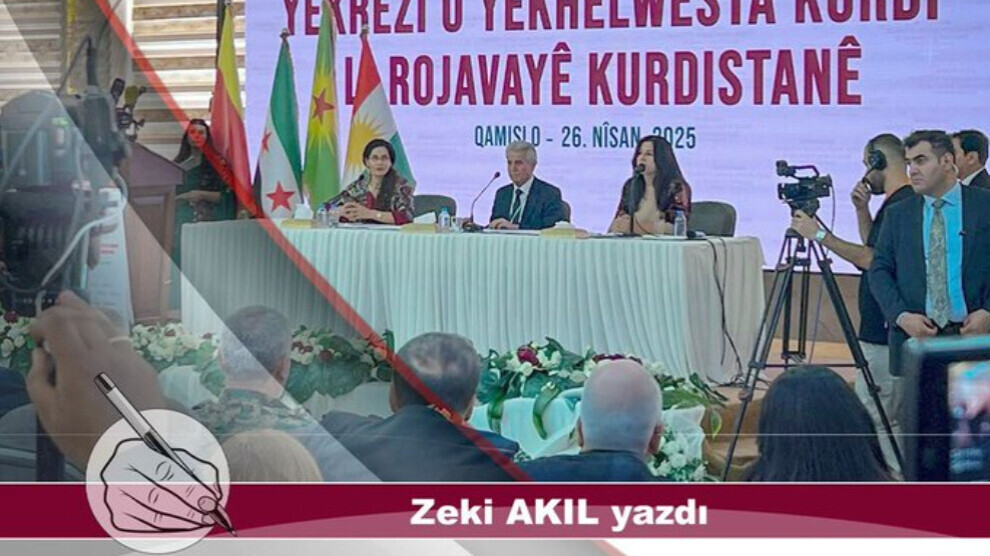Turkey responds with hostility to the Kurdish Unity Conference
The rulers of Turkey say, on one hand, "Let Kurds and Turks be brothers, let the PKK lay down arms," while on the other hand they continue to say, "Let the Kurds suffer."
The rulers of Turkey say, on one hand, "Let Kurds and Turks be brothers, let the PKK lay down arms," while on the other hand they continue to say, "Let the Kurds suffer."

Kurdish parties and political circles held a Unity Conference in Qamishlo. This conference was generally welcomed with satisfaction among Kurds. For years, the Kurdish people have longed for unity. Kurds have fought a lot, risen up, paid heavy prices, but have never managed to achieve unity. The reasons for this disunity are more or less known. Kurdistan was divided among four states. These powers have always worked to prevent Kurdish unity. Additionally, Kurdish uprisings were generally fragmented and local. There were no leaderships or organizations capable of achieving national unity.
Division and disunity were almost seen as the destiny of the Kurds. This perception was first overcome under the leadership of Öcalan. Although the PKK emerged in Northern Kurdistan, it did not remain regional. It organized throughout all parts of the North. It included people from all belief groups and different tribes, gathering them around itself. As a socialist movement led by an enlightened youth, it based itself on the working class and the poor. Thanks to its ideological and class-based choices, it embraced the masses. With Öcalan’s move to Syria, the PKK gradually became the party and vanguard force of all four parts of Kurdistan. It took root among the people there as well. As a force of ideas, it influenced intellectuals and youth. Even though parties like the KDP, which represent Kurdish elites, continued to obstruct national unity, the Kurdish people largely managed to unite. Unity had been achieved at the grassroots level, among the people, but some political parties still resisted coming together.
In Rojava, the Kurdish people largely achieved unity. In their fight against ISIS, they gave tens of thousands of martyrs and wounded. Autonomous administrations were established in the liberated regions. The people both governed themselves and ensured their own security. The only force in Rojava that did not join this unity and opposed the autonomous administration was ENKS. ENKS is actually affiliated with the KDP, the Barzani family. ENKS did not fight against ISIS. It sided with the occupying Turkish state. They joined the so-called "Coalition" controlled by Turkey. When these gangs occupied Afrin and other regions, ENKS was part of them. It did not define Turkey as an occupier. It continuously blamed the PYD and PKK and systematically carried out a propaganda war against the autonomous administration.
When the Ba'ath regime collapsed, ENKS was left in limbo. The Coalition also disbanded. Turkey had no rights or status to offer ENKS. ENKS members initially went to Damascus but returned empty-handed. Öcalan’s “Peace and Democratic Society” call on February 27 had a positive impact in Kurdistan and around the world. Additionally, Öcalan sent a delegation to speak with Southern parties, including the KDP. He wanted to include them in the process. Due to the positive atmosphere these initiatives created and some efforts by certain states, the KDP allowed ENKS to participate in the Unity Conference.
Thanks to the patient and constructive approach of Rojava parties, ENKS was included in the process. This unity was important for the Kurds. It had long been desired, but never realized. What was once considered impossible has happened. This increased the Kurdish people’s hope of achieving unity across all of Kurdistan.
In this conference, Kurds discussed the type of regime they wanted in Syria and their demands, reaching common decisions. The Kurdish people rejected the old status quo and denial. They wanted the opportunity to govern themselves in a democratic Syria. They were not demanding a separate state. Their proposed solution was to live within Syria with their identity, will, and culture.
The fact that a people demand rights stemming from their very existence was once again met with hostility by those who govern Turkey. Turkish officials bombarded the Kurds and Rojava with threats. Ahmet Şara declared these demands unacceptable. They have no concern for democracy or such a worldview. Yet the rulers of Turkey say, “Let Kurds and Turks be brothers, let the PKK disarm,” while continuing to say, “Let the Kurds suffer.” With this mentality, how can Kurds and Turks be brothers? How can bonds of trust be built between them?
The Turkish state, on a small island like Cyprus, insists on establishing a Turkish state even though the whole world is against it. For fifty years they’ve been pushing for two states on that island. But they oppose even the idea that Kurds govern themselves locally. If, instead of Kurds, it were Turks living in Rojava right now, would people like Erdoğan and Bahçeli hold the same views and threaten the Turks? Of course not. But when it comes to Kurds, there are no limits to their hostility. Turkey even prefers HTS, a group viewed with concern and caution by the world, over the Kurds. They want to crush the Kurds under HTS and the gangs it has allied with.
Does anyone really know how many ISIS members are in HTS? Of course not. But it’s clear there are many. And Turkey prefers these dark-minded forces over the Kurds. Kurds and Turks need to think much more deeply about how to build true brotherhood between them!
Source: Yeni Özgür Politika